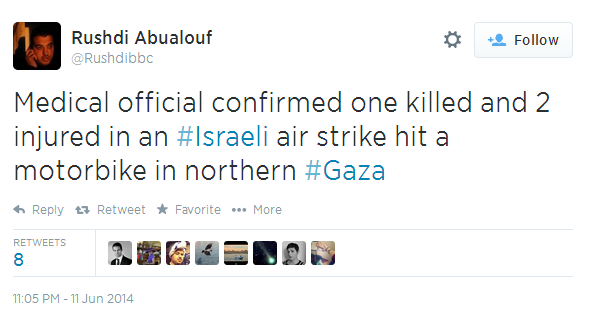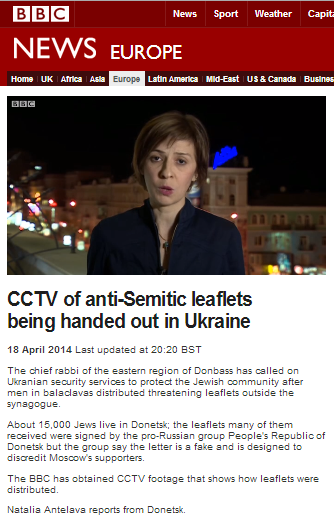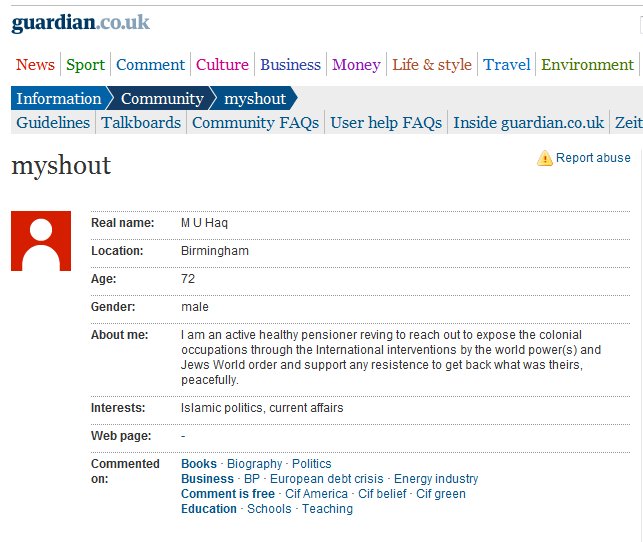Just after midnight on May 10th the attack by Iran that had been anticipated for several days took place in the northern Golan Heights.
“Some 20 rockets were fired at Israeli military bases by Iranian forces in southern Syria just after midnight on Thursday, with some of the incoming missiles being intercepted by the Iron Dome defense system, the army said, amid sky high tensions on the northern border. […]
The Israeli army said the missile barrage was carried out by members of the Iranian Revolutionary Guard Corps’ Quds Forces. This appeared to be the first time that Israel attributed an attack directly to Iran, which generally operates through proxies. The late night rocket barrage was also the largest attack, in terms of the number of rockets fired, in the seven years of the Syrian civil war.”
The BBC News website, however, did not appear to be entirely convinced that Iran was behind the missile fire.
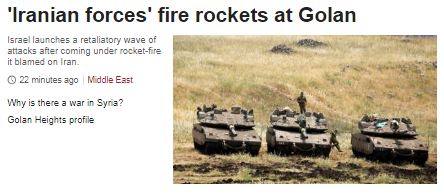
A report that also used qualifying punctuation in its original headline – “Iranian forces ‘fire rockets’ at Israeli positions in Golan Heights” – appeared on the website some three hours after the events began. The first five versions of that report included the following statement:
“…its [Israel’s] government has vowed to stop what it considers Iran’s military “entrenchment” in Syria.” [emphasis added]
Later versions told readers that:
“Israel’s government has vowed to stop what it considers its arch-enemy’s “military entrenchment” in Syria…” [emphasis added]
Apparently the BBC is not persuaded that a foreign power which has moved sufficient military personnel, weapons and equipment into Syria to be able to launch missiles (and previously an armed drone) at a neighbouring country is engaged in military entrenchment.
Under the sub-heading “What happened in the Golan?” readers of earlier versions of the article were actually given an account of what subsequently happened in Syria.
“The Israel Defense Forces (IDF) says it has targeted dozens of Iranian facilities with air strikes in retaliation for the attack, which has not been confirmed by Iran.
It said weapons stores, missile launchers and intelligence facilities were all targeted in the wave of strikes overnight.
Syria’s state news agency Sana said Israeli missiles had been shot down south of Homs, but reported that a weapons depot and a radar installation had been hit.”
The BBC did not inform its audiences that residents of ten communities in the Golan Heights – some 24,000 civilians – had to run for shelter when air-raid warnings were sounded just after midnight.
The sixth version of the report (which by that time had been retitled “‘Iranian forces’ fire rockets at Israeli positions in Golan Heights”) told BBC audiences that:
“Israel has been anticipating a retaliatory attack by Iran since Israel killed seven Revolutionary Guards when it struck Iranian targets in Syria in April. That strike came immediately after Israel brought down what it said was an armed Iranian drone launched from Syria on a mission to attack Israel.” [emphasis added]
Obviously the April 9th attack on the T4 airbase which was attributed to Israel did not come “immediately after” the drone attack which took place two months earlier on February 10th.
Still later versions of the report were again retitled: “Israel strikes Iranian targets in Syria after rockets hit Golan Heights” and “Israel strikes Iranian targets in Syria in response to rocket fire”. Under the sub-heading “Why does Israel hit Iranian interests?” readers found the following claim:
“Iran is Israel’s arch-foe and has repeatedly called for an end to the existence of the Jewish state.”
Iran has not merely “called for” Israel’s destruction but has serially threatened to bring it about while funding and supplying terror groups similarly dedicated to that aim.
Remarkably, the three latest versions of the BBC’s report amplified spurious claims from a source based in Coventry and a pro-Syrian regime source that “Israeli forces had fired first”.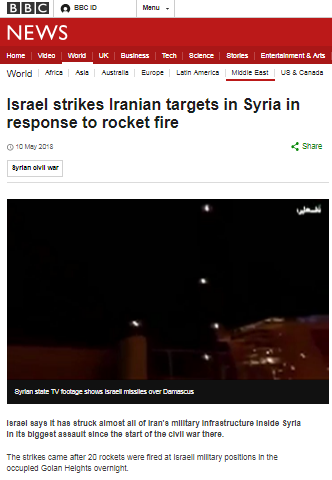
“The Syrian Observatory for Human Rights, a UK-based group that monitors the civil war in Syria, confirmed that “dozens of rockets” were fired from Quneitra province and the south-western Damascus countryside towards the occupied Golan.
It did not identify those responsible, but said the rocket attack came after Israeli forces bombarded Baath, a Syrian-controlled town in the Golan demilitarized zone.
A senior source in an Iranian-led regional military alliance that supports Syria’s government also told AFP news agency that Israeli forces had fired first.” [emphasis added]
As the Times of Israel reported:
“Immediately following the Iranian attack at 12:10 a.m., Syrian state media reported that Israeli artillery fire targeted a military post near the city of Baath in the Quneitra border region, where Syrian regime forces were stationed.” [emphasis added]
A Syrian opposition TV station Tweeted that Hizballah positions near Baath were being targeted almost two hours after the Iranian attack began.
Nevertheless – as readers discovered at the end of the article – while apparently not having bothered to verify those claims before publishing them, the BBC does have the time to answer audience questions.


